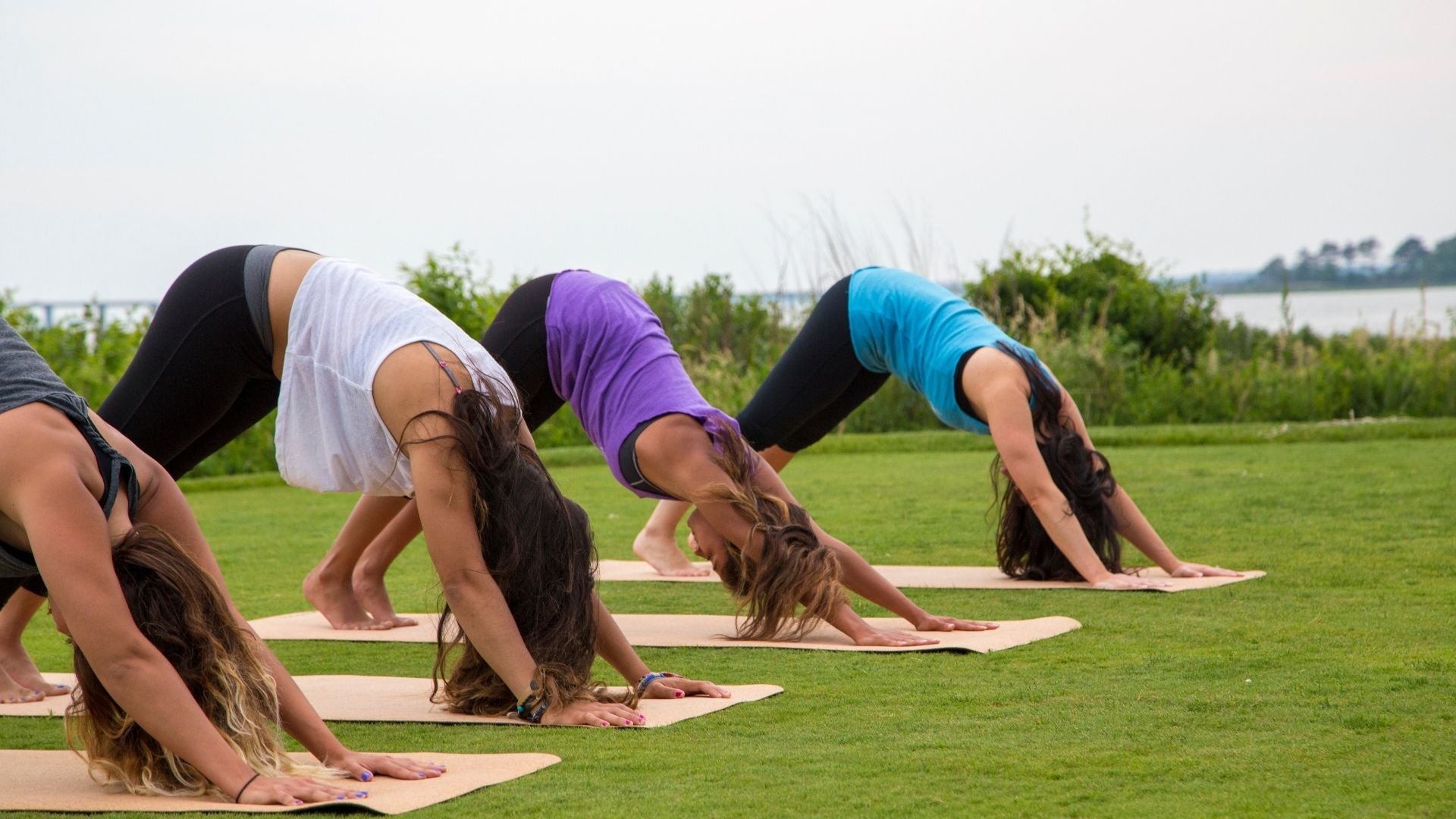Here’s what I know to be true about myself that I’m willing to bet is true about you: I will stop exercising before I’ve reached my potential … if I’m alone. Solo at a gym? I manage 12 squats. Being led by a studio instructor with others surrounding me? Magically, I’m up to 30 and still going strong.
Isn’t that true of life as well? When I’m home alone, my problems feel gargantuan and insurmountable. But when I’m eating a meal with dear friends, suddenly I feel empowered and supported to walk through turmoil successfully.
We were simply not made to go through life alone. As Brené Brown says, we are hardwired for connection.
There’s a reason we end our yoga classes with “Namaste” (“I bow to you”), acknowledging the people around us. Because while I’ve been doing work on my mat, you’ve been doing work on your mat … and we were in it together. There was a connection made.
And that is why doing down dog in the same room as other humans doing down dog matters.
Is a private practice important? Yes. Can YouTube be a helpful guide in a pinch? Sure. But moving and breathing with other humans—that’s where the magic happens. Especially when you turn the occasional class into your intentional, rhythmic yoga community. Here’s why:
We’ve Got a Connection Problem
We are in a day and age where humans are lonelier and more disconnected than ever. In 1980, 20% of Americans said they felt lonely. In 2010, 35% felt lonely. In 2018, we were up to 47% of adults saying they sometimes or always felt lonely.
Social media and technology are obvious culprits, as is a great worldview chasm. But even simpler things like getting overly busy, avoiding chilly winter weather, or a case of the lazies (been there) keep us home. Keep us disconnected. Keep us from looking into the faces and hearing the voices of others.
Science shows us poor social connection leads to weakened immune systems, mental health problems, shortened lifespans, a lack of place attachment, low self-esteem, and apathy toward others.
But a yoga community can reverse those problems and build and strengthen connection.
Besties & Oh Hi Again
Showing up to a class and then showing up again allows you to meet new people who may become good friends (after all, you share similar interests). Or you may expand your pool of casual acquaintances, which you shouldn’t discount.
The New York Times reported a study showing us people who have lots of “weak ties” (think your favorite barista or that lady you see each Tuesday night at hot power yoga) are happier. In fact, the more weak ties you have, the happier you get.
Yin & Yang
Your yoga community simultaneously pushes you (“Yes, I actually can hold that chair pose for 10 more seconds—look at him over there pushing through it”) and reminds you to listen to your gut (“Oh wow—she just rested in child’s pose, I forgot I can do that when I need to, too”).
You are kicked right out of your comfort zone and invited right back in to the comfort of connection.
Similarly, yoga communities also offer guidance from those ahead of us on our journeys. We have access to educated instructors who correct us when we’re doing something wrong, show us how to improve, and teach us how to pull back if injured.
Self-Care & Collective-Care
Yoga is a huge part of self-care—mental, physical, and spiritual. But we can’t stop at self-care. We have to level up to collective-care. (Yes, let’s put on our own oxygen masks first, but once they’re on, we better not let our neighbors suffocate!)
Stanford University’s researchers of organizational behavior did studies showing that moving in synchrony with others boosted:
- Cooperation, working together toward the same end
- Collectivism, giving a group priority over each individual
When you take a power class that feels impossible to get through or a still, quiet yin class (that, honestly, may also feel impossible to get through) and lift your head to look at the faces of everyone accomplishing a hard thing together … that’s when yoga practice becomes cooperation practice. And cooperation practice leads to patience and teamwork.
Or when each of us practicing beautiful self-care on our mat looks up and sees every other person also deserving of that exact same self-care on their mat (and care in their own lives) … that’s when yoga practice becomes collectivism practice. And collectivism practice leads to justice and empathy.
Namaste
Since each class ends in Namaste, let’s end there too. Perhaps there isn’t a better way to feel connected and part of a community than by regularly acknowledging that other people have the same inherent worthiness in them that you have in you. And having all those other people do the same for you.
You see, being a part of a yoga community at the very least is motivating and encouraging (who doesn’t need more of that?), but at its best, it may even save your mental health or your life.
So, embrace the awkward. Show up. Compliment somebody on their cool cork mat or ask them how their day has been. Do the work together. Mean the Namaste. Then take those lessons and connection off the mat. Rinse, repeat.
Taylor Duval
Taylor DuVall is a creative: writer, poet, editor, musician, and book publisher. After graduating with an English degree from the University of Nevada, Las Vegas, Taylor took her wordsmith skills abroad as a freelance writer and editor. Traveling from place to place, she wrote and edited online content for small businesses, largely in the health and wellness field. Today, Taylor lives in Charleston, South Carolina, where she continues to write and get involved in her community. When not in her office, you can find her by the ocean, in an antique shop, on a yoga mat, or with her nose in a book.


